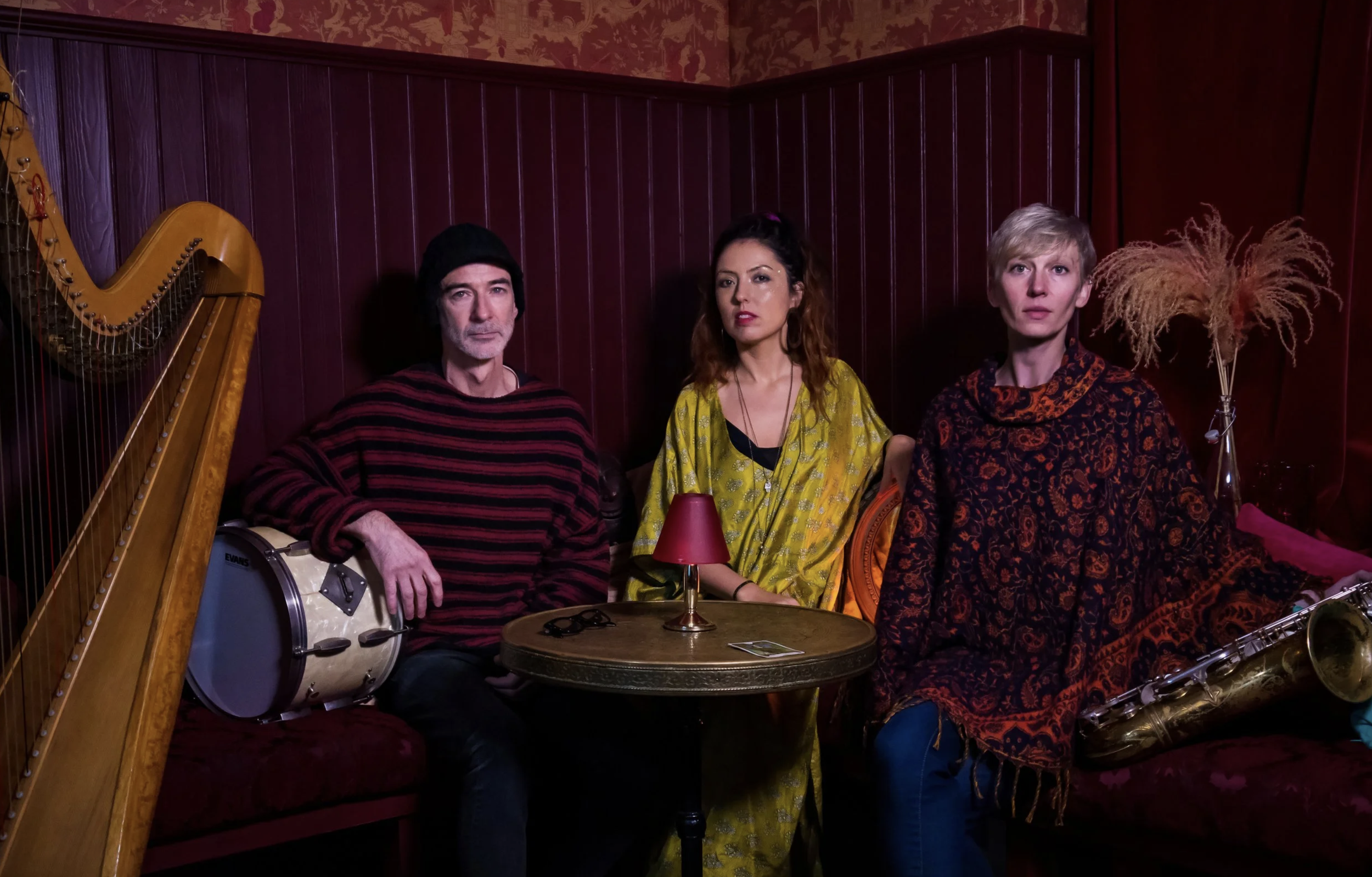TBC introduces… Maria-Christina Harper
Can you tell us what you've been up to since the release of Passing By, and since you last played at The Bear Club back in 2023 - have there been other projects in the meantime, or were you working on the new album?
We've been performing at lots of festivals and playing gigs, and on the 24th of October, our second album was released. We recorded that a few months ago at Abbey Road, Studio Three, which was exciting.
It has been a really nice journey since it came out. We celebrated our release on BBC Three, we played live and had an interview there as well. Now we are touring the UK, starting in London. We played at Pizza Express Soho as part of the EFG London Jazz Festival, which was a really nice receptive audience. We also played for One Jazz at Jazz Social for Jazz FM. Now we travel north, and our last stop of the tour is The Bear Club, which we are really looking forward to returning to.
The new album, Dialogue of Thoughts, has been really well received. It feels like a development of the sound beyond the previous album - some more up-tempo tracks like "Walk" and "Madness" have a kind of free jazz, almost post-punk feel to them, using the electro-harp more for rhythm than for harmony, with more instrumentation than before. Is this a conscious change of direction?
The reception of the first album was amazing. And then when it's time for the release of the second album, you are thinking, "How will this go? How will the audience react?" People have been saying, "I love the first album, but I love the second one even more", which is great.
It's great because we've been exploring more, and I have been more open in how I write. There are more dynamic pieces on this one. There's a mixture of stillness, but also excitement and explosion. We have two new tracks with spoken words, which is a new element again compared to the last album. The reception has been really great, and people are really loving it. That makes me very happy because I'm excited to share it with people who love to hear it.
The new album has a track featuring Cairo in the title, as did the last album. Can you tell us a bit about your multi-cultural background and how it influences your music?
My grandparents are from Egypt. I always had a fascination with ancient Egypt and Arabic, all the mythology and the beauty of mysticism. I had a very strong connection, especially to my grandmother. She had this coat she had made, which I loved to wear whenever I could. I was inspired by her coat, and so I named the first song "Cairo" to remind me of her in a way.
The second one wasn't a conscious decision, but then I started writing this piece, and it just reminded me of Cairo again. So, I thought, there’s something here I would like to play with in titles and words. So, it's sort of a sibling if you like, connecting the first album to the second one, soundscape-wise.
Away from the music, performing, writing and recording, what do you like to do - what does your downtime look like?
I like swimming, I like eating, I like reading. Meditation is one of my fascinations - I have been doing it regularly, especially in the last year. I try to do it every day. I like photography too, but at the moment, the massive thing would be breathing and meditation.
The harp is a fabulous instrument, so elegant, and the purveyor of a shimmering, resonant sound. When lit correctly, by far the most beautiful instrument in an orchestra. How did you get into it originally?
I was born in Greece. When I was four, I saw a cartoon of a cat playing the harp in a jazz setting somewhere in Paris. This must have stayed embedded in my mind somewhere. I started to learn music, but there were no harpists in Greece, so I started to play the piano. Then a harpist came from another country, and I started playing the harp. I realised how amazing it was, but never really thought about how I would transport it around. I definitely hadn't thought about that when I was four.
I do agree there is something about the sound. I think it's like the vibraphone. It has this sustain, and you can hear all these harmonics, and there isn't a specific attack on it. It just circles you, instead of coming towards you as a wind instrument would do. I think there is something beautiful in that. On stage, I don’t think there is any other instrument where you see through it, see both sides of it, which makes it quite magical.
Did you follow a classical route when learning the harp, or by listening to the famous harpists within the jazz tradition - people like Alice Coltrane and Dorothy Ashby?
To be honest, I love both of them. But when I was growing up, it was mainly classical for me. I knew Alice Coltrane and Dorothy Ashby existed, but it wasn't something that I would listen to. Outside of classical music, I would listen to 60s, 70s rock and then some 90s, or the Beatles, all of that kind of music.
When I became an adult is when I started listening to Alice Coltrane. I really like her soundscape. She creates a beautiful world, a beautiful sound cosmos where the harp is really used as decoration. Dorothy Ashby uses the harp in a more specific piece made for the harp. I really respect her music and like what she has been doing, what she has done. Maybe in another universe, who knows.
If you're on stage performing, and you could appear with absolutely anybody, dead or alive - you're playing your beautiful harp at the Royal Albert Hall in London, and you can see this other musician through the harp playing with you - who would that be?
I've actually thought about this question before, and I go back and forth. I can’t decide. It would be JS Bach or Jimi Hendrix, someone who would be amazing at what they have been doing. And these two are big influences.
I will go for Johann Sebastian Bach. He was extremely talented. It's not like today, where most things you hear are an adaptation of something that has already been played or composed. There is not so much discovery now. Don’t misunderstand me, there is still a lot of amazing music being created, but more influenced by what has gone before. But back then in the 18th century, there was so much to discover. He was an expert at playing, and he had these beautiful ideas.
Can you give us a heads up on an artist or album that you think we might not have heard and ought to check out?
You should listen to Ill Considered. They’re a London-based jazz free-improvisation group. They’ve released several albums, including Liminal Space and Precipice. Their music is a blend of influences from free jazz, Afrobeat, spiritual jazz, and world music. I like them a lot.
Can you tell us a little about what we can expect from your show at The Bear?
We'll play a mixture of older pieces, but mainly we'll share and present our new material. I will be travelling with the audience, guiding them on each piece, telling them a little bit about the story behind each piece. Explaining the concept, the idea, the inspiration.
There will be a nice mixture of relaxing, enjoying quiet moments, but also hearing the sound and the explosion that the trio can take to the audience. It has been really nice having this fluidity, the ebbing and flowing of extreme dynamics. Incredibly soft, very quiet, and then quite loud and thunderous.
I like having a little bit of structure, having a specific melody that someone can leave and have in their mind, but also allow for some space, especially in our live sessions, where we don't know what will happen next, in a positive way. We don't know where it will lead us, and it makes us feel excited about that. We never play the same gig. Obviously, the melodies are the same, but the improvisation always adds to that.
Maria-Christina joins us with her trio on Thursday 27 November 2025

